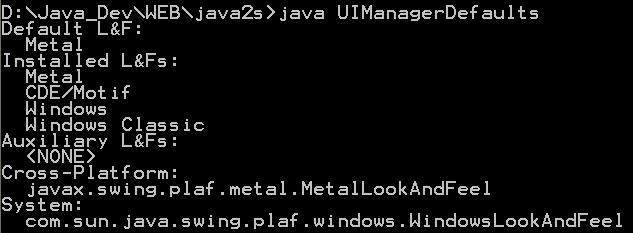UIManager defaults : UI « Swing JFC « Java
- Java
- Swing JFC
- UI
UIManager defaults

//An informational utility to print the various UIManager defaults.
import javax.swing.LookAndFeel;
import javax.swing.UIManager;
public class UIManagerDefaults {
public static void main(String[] args) {
System.out.println("Default L&F:");
System.out.println(" " + UIManager.getLookAndFeel().getName());
UIManager.LookAndFeelInfo[] inst = UIManager.getInstalledLookAndFeels();
System.out.println("Installed L&Fs: ");
for (int i = 0; i < inst.length; i++) {
System.out.println(" " + inst[i].getName());
}
LookAndFeel[] aux = UIManager.getAuxiliaryLookAndFeels();
System.out.println("Auxiliary L&Fs: ");
if (aux != null) {
for (int i = 0; i < aux.length; i++) {
System.out.println(" " + aux[i].getName());
}
} else {
System.out.println(" <NONE>");
}
System.out.println("Cross-Platform:");
System.out.println(UIManager.getCrossPlatformLookAndFeelClassName());
System.out.println("System:");
System.out.println(UIManager.getSystemLookAndFeelClassName());
System.exit(0);
}
}
Related examples in the same category